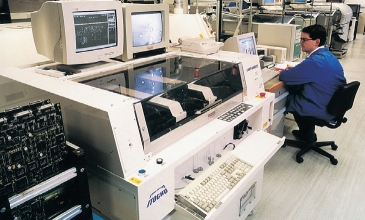PCB Assembly
 Highly motivated and skilled staff use state-of-the-art processes and equipment to consistently achieve high yield and placement accuracy for all types of SMT device, including 0201, ultra-fine pitch, BGA, micro-BGA, CSP and larger odd-form packages. Both placement and printing processes utilise electronic visual alignment systems with some machines also having electronic component value checking on the fly.
Highly motivated and skilled staff use state-of-the-art processes and equipment to consistently achieve high yield and placement accuracy for all types of SMT device, including 0201, ultra-fine pitch, BGA, micro-BGA, CSP and larger odd-form packages. Both placement and printing processes utilise electronic visual alignment systems with some machines also having electronic component value checking on the fly.
Conventional Through-Hole PCB Assembly
As with other processes the method of assembly chosen for a given board is dependent upon the design and quantity involved. Turner & Fox Electronics has a comprehensive array of PCB assembly techniques for leaded components, including hand assembly using light-guided, powered flow line or fully automated axial and radial insertion.
Complimentary machine selection and plant culture gives the group a high degree of specialisation whilst covering a diverse field of PCB assembly.
Prototype to High Volume Production
Turner & Fox Electronics has for many years offered the full service from 1-off produced in a few hours to higher volume continuous PCB assembly against long term schedules. Whether surface mount, conventional through hole or complete product assembly and test the group has a proven ability to react to changing demands.
Full Procurement or Consigned Kits
Turner & Fox Electronics' large spend and significant resultant purchasing power is brought to bear on all procurement activity. Many customers have found their material costs reduced whilst the continuity of supply has been improved by passing over responsibility for purchasing to Turner & Fox Electronics' buying departments. By working together the partnership of customer and manufacturer invariably yields the greatest savings getting product to market more swiftly at the optimum price.
Environmental Care
Turner & Fox Electronics cares about the environment and uses processes which do not involve the use of ozone depleting chemicals. The employment of no-clean low residue solder fluxes and pastes is predominant, aqueous alternatives are also available with no environmentally damaging solvents used in PCB assembly processes.